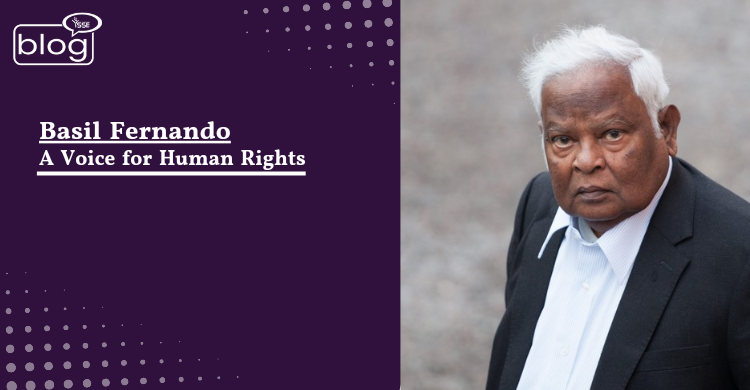Basil Fernando, born on 14 October 1944 in Sri Lanka, Hong Kong based human activist. He has been active in human rights and social action issues continuously from his youth.
As a Sri Lankan, Basil Fernandoa was raised in a country with a rich cultural history but individuals often overshadowed by political unrest and social inequality. Growing up in a society significant by fixed unfairness, Fernando observed primary struggles of neglected communities. These early situations shaped his view and planted the seeds for his lifelong dedication to human rights.
He completed his graduation from the Faculty of Law of the University of Ceylon, Colombo, Sri Lanka in 1972, and then He was an ESL teacher at the University of Sri Jayawardanapura for eight years. The political turmoil and civil conflict in Sri Lanka during 1980 He had to leave srilanka but these moments influenced Fernando’s path. After violence and authoritarianism escalated, he recognized the urgent need for legal reforms and protection for those most vulnerable to abuse. These influential years acted as the pivotal role for his extraordinary journey as a human rights advocate, encouraging him to seek justice not just in his homeland but across Asia and beyond.
At the Supreme Court of Sri Lanka, he practiced law from 1980 to 1989 with a focus in Criminal Law, Employment Law and Human Rights Law. His legal training has prepared him with the skills to handle the challenges of the justice system as well as enhanced his commitment to addressing the systemic issues that maintained inequality.
During the early 1990s, he joined the United Nations Transitional Authority in Cambodia (UNTAC), where he worked as a human rights officer. His experience in Cambodia revealed to him the devastating impact of systemic violence and privilege, further shaping his resolve to address systemic issues within justice systems. In 1994, Fernando took on a role as the Director of the Asian Human Rights Commission (AHRC). Under his leadership, the AHRC became a leading voice for human rights advocacy in Asia, focusing on issues such as torture, judicial corruption, and the rights of the disenfranchised.
He is an author of numerous works on human rights and legal reform, including Problems Facing the Cambodian Legal System, Demoralization and Hope: A Comparative Study of the Ideas of N.F.S. Grundtvig of Denmark and B.R. Ambedkar of India, Modernization vs Militarization: Ethnic Conflict & Labour in Sri Lanka, The Inability to Prosecute, Power vs Conscience, and Sri Lanka’s Dysfunctional Criminal Justice System. He co-authored The Phantom Limb with Martin Koch Andersen and has co-edited books like Decline of Fair Trial in Asia, contributing extensively to journals, magazines, and newspapers.
Fernando is the Chief Editor of Human Rights SOLIDARITY and editor of Article 2, a quarterly magazine. He has pioneered programs fostering a human rights culture in Sri Lanka through creative works and monuments and has conducted nearly 100 workshops on reconciliation and legal reform. He initiated the Judicial Assistance Programme for Cambodia, the Religion and Human Rights Programme of the Asian Human Rights Commission, and co-founded the Asian Alliance Against Torture and Ill-Treatment in 2012.
Basil Fernando is celebrated globally for his steadfast dedication to human rights advocacy and justice reform, addressing systemic issues like torture, impunity, and judicial corruption in Asia. His accolades include the Right Livelihood Award (2014) for lifelong dedication to justice, the Gwangju Prize for Human Rights (2022) for judicial reform advocacy, the Rene Cassin Medal (2023) for tackling justice system deficiencies, and the Asian Human Rights Lifetime Achievement Recognition for transformative leadership. These honors solidify his legacy as a champion of human rights and inspire action worldwide.
Basil Fernando was also recognized as not only a champion in the field of human rights but also an inspiration to policymakers, activists, and lawyers in the whole world. His awards underscore the commitment to justice, standing as a reminder of what one man can do to contribute towards the struggle for dignity among humans.
His legacy beckons all those who believe in the purity of human dignity and the rule of law into action. In a world still troubled by inequality and injustice, his story stands as a symbol of hope and a blueprint for meaningful change.
To read more blogs, Click here
Writer,
Anika Sharmila
Intern, Content Writing Department
YSSE

